Key takeaways:
- Ocean conservation is vital for regulating climate, supporting livelihoods, and sustaining biodiversity; our actions directly impact marine ecosystems.
- Key threats to oceans include plastic pollution, overfishing, and climate change, which require urgent action to prevent ecosystem collapse.
- Engaging in sustainable diving practices, such as minimizing waste and practicing proper buoyancy control, helps protect marine habitats.
- Advocacy and sharing personal experiences about marine conservation can inspire others to take action and foster a collective commitment to ocean protection.
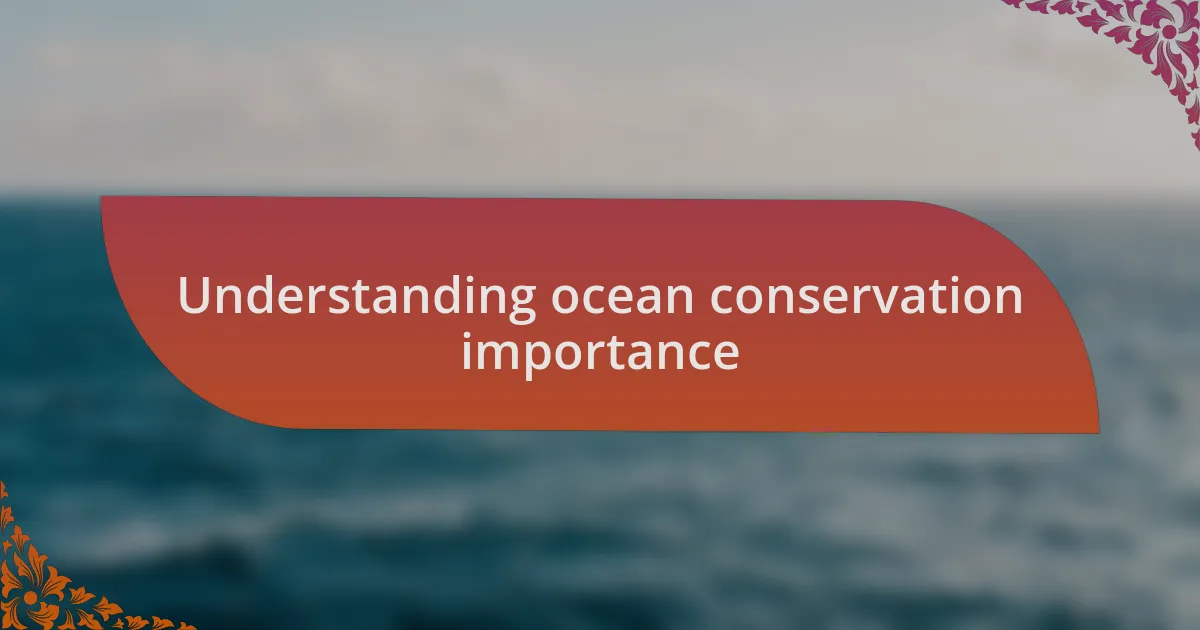
Understanding ocean conservation importance
When I first started diving, I was amazed by the vibrant ecosystems beneath the waves. However, witnessing the decline of these habitats due to pollution and overfishing was heart-wrenching. It made me realize that ocean conservation is not just about preserving beauty; it’s about protecting livelihoods and the very foundation of life on our planet.
Think about it—how often do we consider the role oceans play in regulating our climate? These vast waters absorb carbon dioxide and produce more than half of the world’s oxygen. I remember a diving trip where I felt the currents shift, and it struck me how interconnected everything is. Without healthy oceans, the ripple effects on weather patterns, food security, and biodiversity can be catastrophic.
Every time I’ve explored a new underwater realm, I’ve felt a mix of wonder and responsibility. Each dive has reinforced for me why conservation isn’t just important; it’s crucial for our survival and the future of generations to come. Knowing that we have the power to make a difference fills me with hope. What actions will you take to contribute to this essential cause?
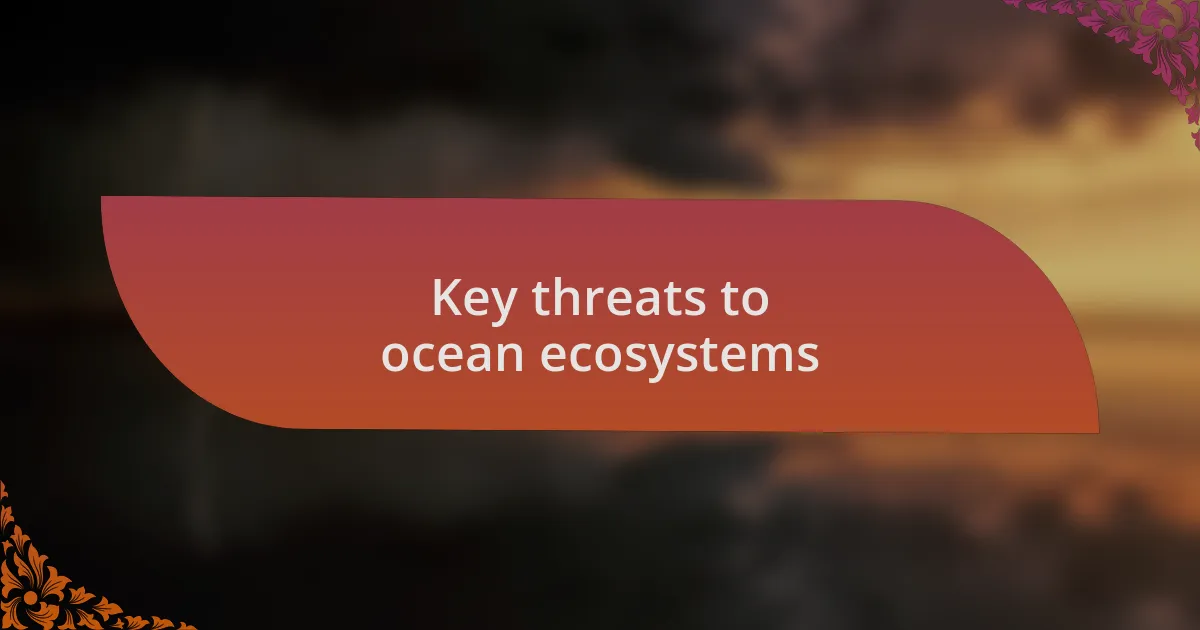
Key threats to ocean ecosystems
One of the most significant threats to ocean ecosystems is plastic pollution. On one of my dives, I encountered a beautiful coral reef, but my heart sank when I spotted pieces of plastic tangled around the vibrant corals. It struck me how such a simple, human-made material could wreak havoc on delicate marine life, leading to entanglement and ingestion by the creatures that call the ocean home. Why would we allow our waste to invade such pristine environments?
Overfishing is another critical issue. During a snorkeling trip, I observed areas where schools of fish once thrived, now eerily empty. This depletion not only disrupts predator-prey relationships but can also lead to the collapse of entire ecosystems. It’s alarming to think that our demand for seafood can result in devastating losses, affecting biodiversity and the overall health of the ocean.
Climate change plays a daunting role as well. I remember feeling the increasing warmth of the water during dives over the years, a clear indicator of rising sea temperatures. These shifts can lead to coral bleaching events that devastate reefs, where countless species find their homes. What might our oceans look like in the coming decades if we don’t take action now? The urgency of addressing these threats weighs heavily on my heart, reminding me that every small effort counts.
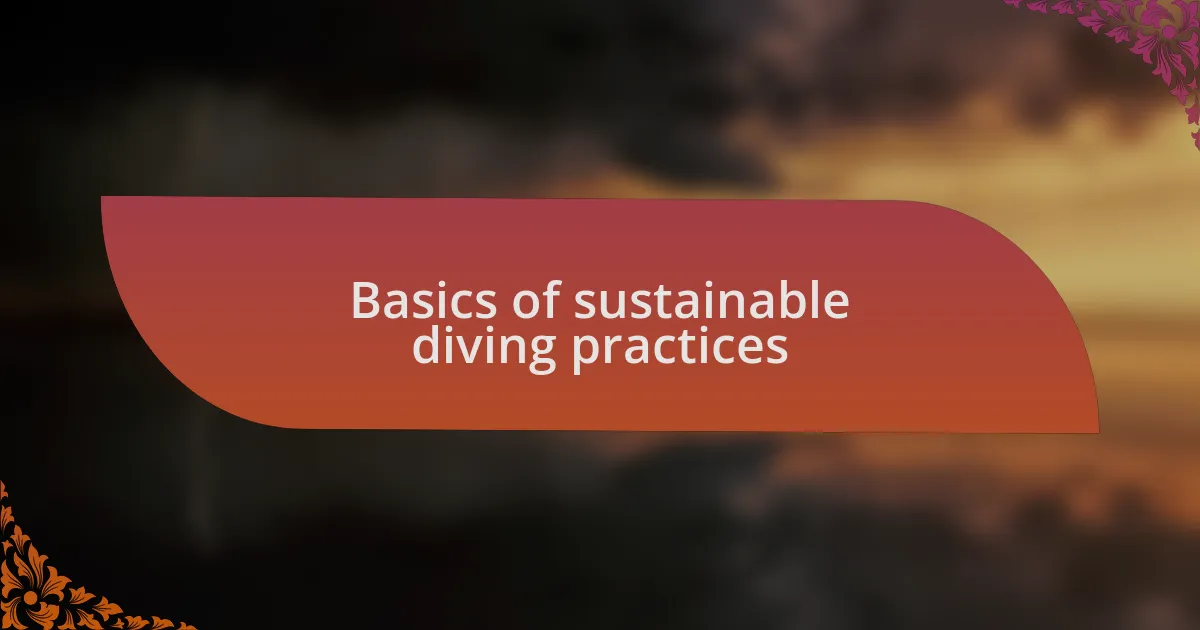
Basics of sustainable diving practices
Sustainable diving practices hinge on respecting marine environments and minimizing our impact. On one memorable dive, I consciously chose to avoid touching the coral and marine life around me. Witnessing the vibrant ecosystem thrive undisturbed felt immensely rewarding. Isn’t it fascinating how simply refraining from physical contact can preserve marine habitats?
Another crucial aspect of sustainable diving is managing waste. I vividly recall a dive where I witnessed divers carelessly dropping snack wrappers into the water, which left me feeling frustrated. Ensuring that we leave no trace and take all our trash back with us is a small but mighty step we can take. Have you ever thought about how much of our waste can be avoided if we plan ahead for our underwater adventures?
Finally, it’s important to practice proper buoyancy control. This skill not only enhances the diving experience but also protects fragile habitats like seagrass and coral. While struggling to master buoyancy during my early dives, I learned that every fin kick could either stir up sediment or keep it settled. Don’t you believe that being mindful of our movements underwater can lead to more harmonious interactions with marine ecosystems?
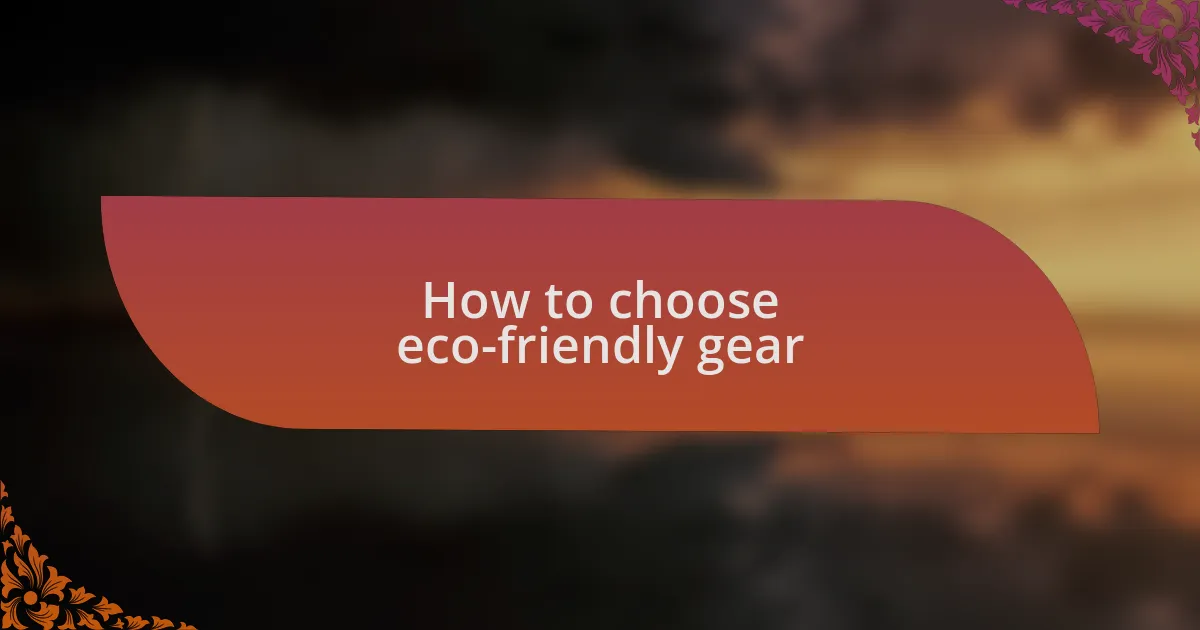
How to choose eco-friendly gear
Choosing eco-friendly gear for diving can sometimes feel overwhelming, but I’ve found that a few key principles really guide my decisions. For instance, I always look for products made from sustainable materials, like recycled plastics or natural fibers. One time, I replaced my standard dive bag with one made from recycled ocean plastics. Not only did it feel great to support sustainability, but the bag also held up remarkably well over time.
Another crucial element is the option to buy second-hand gear. I recall finding a perfectly good wetsuit at a local dive shop’s consignment section. It was a thrill to know that I was reducing waste while scoring excellent quality gear at a fraction of the price. Have you ever thought about how many perfectly functional products exist just waiting for a new home?
Lastly, consider the company’s ethics when purchasing gear. I make it a point to support brands that prioritize environmental initiatives and give back to ocean conservation efforts. When I learned that a portion of my purchase was going to marine research, it felt like I was diving for a cause. Isn’t that a win-win situation where you can gear up while protecting what you love?
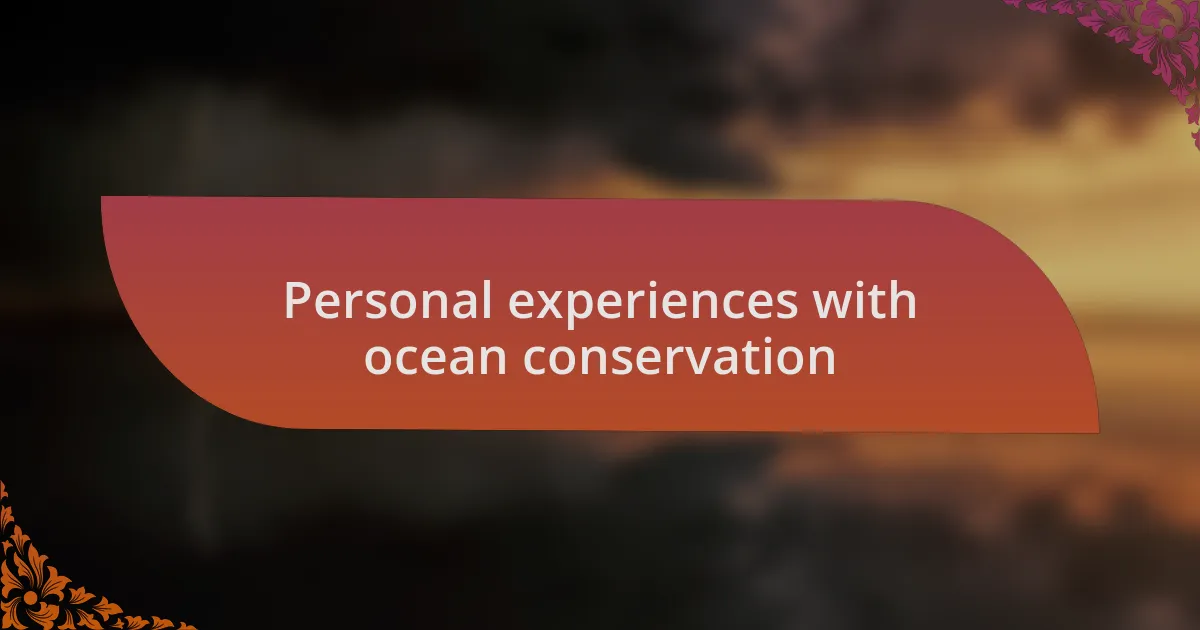
Personal experiences with ocean conservation
In my journey as a diver, I’ve participated in several community clean-up dives that have profoundly shaped my view on ocean conservation. The first time I joined such an event, I was struck by how much litter was submerged beneath the surface. The sheer volume of plastic, discarded fishing lines, and tires was shocking. It made me realize that our oceans are not just beautiful but also burdened, and it’s our duty to help lighten that load.
There was one particular dive that remains etched in my memory. I dove at a site notorious for coral bleaching. As I settled into the water, I felt a mix of anticipation and dread. Witnessing the vividly colored corals fading into dull hues was heartbreaking; it was a stark reminder of the impacts of climate change and pollution. I couldn’t help but think—how many more of these spectacular ecosystems could we lose if we don’t act now?
Engaging with local marine conservation groups has also enriched my perspective. I remember attending an awareness workshop where we learned about the delicate balance of marine life. Hearing stories from researchers about their frontline battles against overfishing and habitat destruction left me inspired yet alarmed. Have you ever felt that surge of urgency when you realize your passion directly impacts something greater than yourself? It’s that realization that drives me to advocate for ocean preservation beyond just my diving experiences.
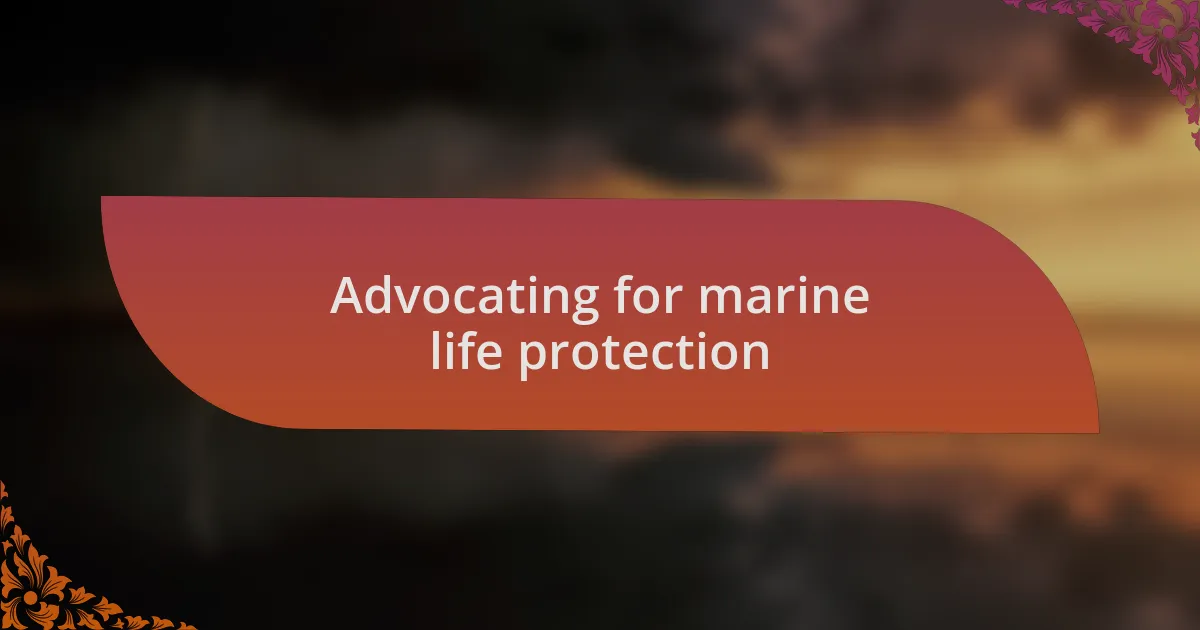
Advocating for marine life protection
Participating in advocacy for marine life protection ignites a fire within me. I remember standing on a beach filled with fellow ocean lovers, passionately discussing ways to combat plastic waste. That moment of collective determination was electrifying; it showed me how many people genuinely care about the health of our oceans. How can we not unite our voices when the stakes are so high?
During one of my dives, we encountered a turtle entangled in fishing gear. The sight was both distressing and motivating. It shook me to my core, reminding me that our underwater friends are suffering from our actions. It really made me ask myself: what if that turtle was lost forever because I didn’t advocate for stronger regulations on fishing practices? In that moment, I vowed to be a champion for marine life, knowing that even one voice can spark change.
I’ve often found that the most effective way to raise awareness is through personal stories. Sharing my experiences with friends and family prompts them to rethink their habits and consider their own impact on the ocean. When have you last inspired someone to care about marine conservation? I cherish those conversations; each one feels like a ripple that can lead to a much larger wave of change for our oceans.
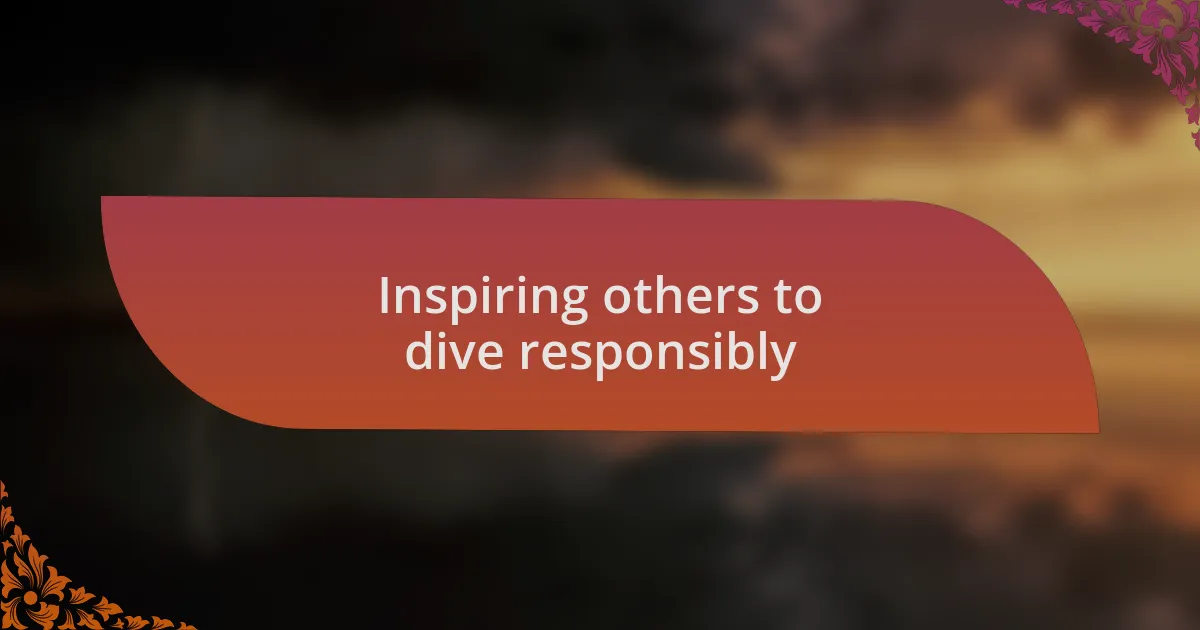
Inspiring others to dive responsibly
When I take a moment to reflect on my diving experiences, I often think about the first time I brought a friend along. Their wide-eyed wonder transformed into genuine concern as we floated above a coral reef, witnessing its brilliant colors and the life teeming within it. I could see the realization dawn on them: this beauty is fragile and in need of protection. Have you ever witnessed that shift in someone? It’s incredibly powerful to inspire someone to dive responsibly, knowing they will leave with a deeper appreciation for our oceans.
One time, during a dive cleanup, I watched as another diver carefully disposed of a plastic bag. It struck me that each small action adds up. I remember how inspired I felt to chat with them afterward, sharing tips on minimizing our underwater footprint. This sense of camaraderie is what drives me to engage others in conversations about responsible diving practices. If we all take small steps, can you imagine the collective impact we could make?
I often encourage divers to share their experiences on social media, sparking conversations about ocean conservation. I recall a post from a fellow diver who captured a mesmerizing image of a sea turtle gliding through the water, paired with a passionate message about respecting their habitat. It sparked countless comments, with many people expressing their newfound commitment to responsible diving. It’s moments like these that remind me of our ability to inspire change, one story at a time.